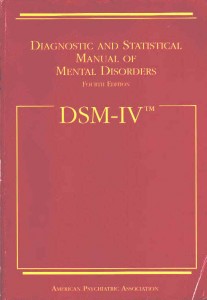I was pretty excited to watch “Diagnostic & Statistical Manual: Psychiatry’s Deadliest Scam,” a production of Citizen’s Commission on Human Rights. Most people in the mental health field are anxiously awaiting the official reveal of the updated Diagnostic and Statistical Manual (DSM) – the book that outlines and defines all known mental health disorders. 
There are even debates about the potential changes. Whether you love it or you hate it, this book does make a big impact on our field. As a practitioner I am not a big fan of diagnosis, but I believe insurance is to blame for this more than the DSM.
Most people want their insurance to pay for treatment, even when simply dealing with the normal grief of losing a loved one, stress regarding life changes, or marital problems. However, for insurance to fund treatment, a diagnosis is required.
These kinds of situations, in my opinion, have led to the exaggeration of common life problems into diagnoses more so than the DSM itself. Most people, even when given the choice, choose diagnosis for the benefit of insurance-funded treatment. While this might save money and stress immediately, there are many longterm consequences of mental health diagnoses.
A diagnosis of Major Depressive Disorder, for example, has been known to make it difficult to impossible to obtain life insurance, even when the diagnosis is more than a decade old. A financial planner on Twitter recently told me that he has seen clients denied disability insurance as a result of diagnosis.
While I found “Diagnostic & Statistical Manual: Psychiatry’s Deadliest Scam” to be a bit alarmist, it is not entirely incorrect. I don’t believe the problem with over-diagnosis is a conspiracy of psychiatry, but rather a responsibility shared by practitioners, insurance companies, and those seeking treatment.
Diagnosis is intended to be a quick explanation to communicate between health care providers regarding a cluster of symptoms and proper treatment for the condition. Diagnosis is also used to justify insurance-funded treatment.
There are a lot of problems with our system of diagnosis and how the DSM is applied. The DSM is not likely to go away; though it is not a perfect tool or ideology, it is the best tool we currently have. While it can be improved, we also need to improve the way that practitioners apply diagnosis.
If you are considering counseling for any reason in your life, I encourage you to watch “Diagnostic & Statistical Manual: Psychiatry’s Deadliest Scam,” and consider paying the therapist directly rather than requesting insurance reimbursement.
Also Read:
